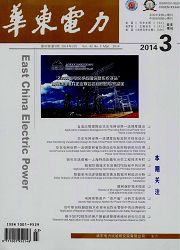

 中文摘要:
中文摘要:
传统GM(1,1)模型在参数α的绝对值较小的情况下近期刖电量预测精度较高,中期用电量预测往往误差较大,一定程度上是由于GM(1,1)模型的背景值x^(1)(k)取前后2个时刻的平均值造成的。引入向量θ得背景值序列的精确计算式,将GM(1,1)模型推广为GM(1,1,θ)模型。应用微粒群优化这一智能算法求解最优向鼠,从而构建GM(1,1,θ)模型,并将该模型应用于山东省中期用电量预测。实例分析表明,与传统GM(1,1)预测模型相比,智能优化模型较好地得到了预测点的预测结果,更适用于中期用电量预测。
 英文摘要:
英文摘要:
The conventional GM( 1, 1 ) model is accurate in short-term electricity demand forecasting but has more errors in middle-term forecasting when the absolute value of the parameter a is relatively small. To some degree this is because that the background value x^(1) (k) of GM( 1,1 ) is defined as the average of two sequent moments. The vector θ was introduced into the accurate calculation formula of background value array, and GM ( 1,1 ) was consequently generalized into GM ( 1,1,θ). As particle swarm optimization has the virtue of optimum seeking, it was applied to solving the value of θ as well as the optimization model. The forecasting results demonstrate that the intelligent optimization model GM (1,1,θ) has higher forecast precision and adaptability for middle-term electricity demand forecasting.
 同期刊论文项目
同期刊论文项目
 同项目期刊论文
同项目期刊论文
 期刊信息
期刊信息
